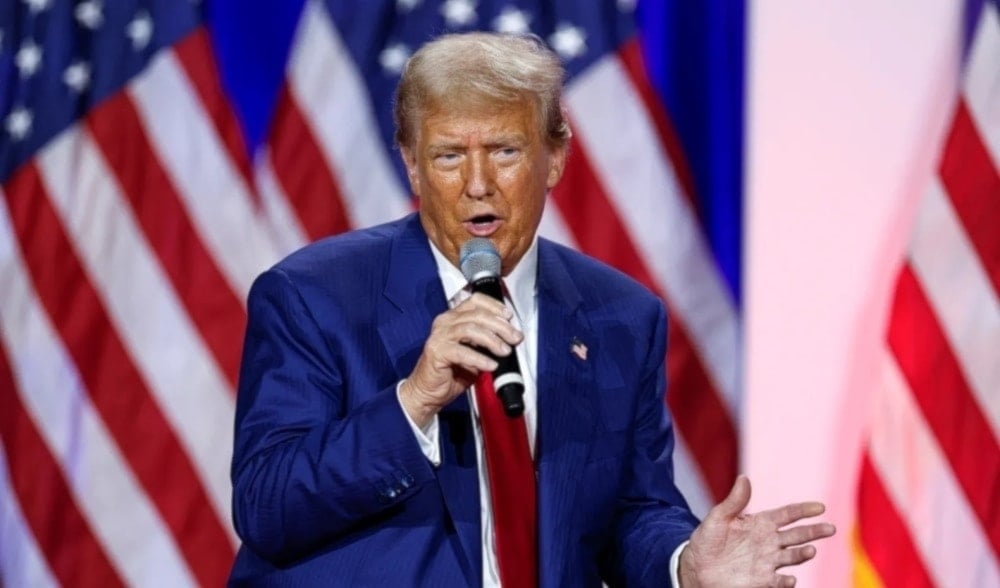Trump orders probe into legal advisor over financial misconduct
An internal review has reportedly revealed "troubling behavior" by Trump’s legal advisor, Boris Epshteyn.
-

Former President Donald Trump speaks during a town hall meeting in La Crosse, Wisconsin, on August 29, 2024. (AFP)
US President-elect Donald Trump has instructed his top advisors to investigate allegations of impropriety involving his legal advisor, Boris Epshteyn, according to sources familiar with the matter, as reported by ABC News.
The allegations, made by individuals close to Trump’s transition team, claim that Epshteyn used his proximity to the President-elect for personal financial gain by suggesting he could secure administration roles in exchange for payments.
An internal review conducted by Trump’s lawyers uncovered patterns of "troubling behavior", the sources revealed. The investigation reportedly found that Epshteyn solicited monthly consulting fees from individuals seeking access to Trump, including one alleged request for $30,000 per month to promote a candidate for a Treasury position near Trump’s Mar-a-Lago Club. Additionally, Epshteyn allegedly attempted to convince the same individual to invest $10 million in a private basketball league, which was declined.
In response, Epshteyn denied any wrongdoing, stating, "These fake claims are false and defamatory and will not distract us from Making America Great Again."
Dive deeper
Former Missouri Governor Eric Greitens provided a sworn statement during the review, describing an interaction where Epshteyn's behavior "suggested he might entertain offering a position in the administration in exchange for financial consideration." However, no explicit offer was made.
Speaking to Just the News, Trump expressed frustration with the situation, saying, "I suppose every president has people around them who try to make money off them on the outside. It’s a shame, but it happens. But no one working for me in any capacity should be looking to make money. They should only be here to Make America Great Again."
Steven Cheung, Trump’s incoming White House communications director, confirmed that the team is reviewing consulting agreements, including Epshteyn’s. "We are now moving ahead together as a team to help President Trump Make America Great Again," Cheung said.
As of Monday, Epshteyn remained employed by Trump, and it is unclear whether the results of the internal investigation have been formally presented to the President-elect.
Trump selects Tulsi Gabbard for intel. chief, enrages establishment
Last week, President-elect Donald Trump's selection of Tulsi Gabbard as the United States' intelligence chief raised alarms within the national security establishment, triggering fears that the intelligence community could become more politicized.
Gabbard, a former Democratic congresswoman with limited experience in intelligence and a reputation for being more critical toward US policy on Russia and Syria, is one of several key appointments that indicate Trump might be favoring personal loyalty over qualifications as he forms his second-term administration, Reuters reported.
Current and former intelligence officials and independent experts are alleging that Trump might receive distorted views while his top officials seek to please him by withholding important information rather than ensuring or prioritizing "national security".
A Western security official noted that there could be an initial slowdown in intelligence sharing when Trump assumes office in January, potentially affecting the "Five Eyes" alliance, which includes the US, Britain, Canada, Australia, and New Zealand. The concern among US allies is that Trump’s appointments are generally seen as aligning with the "wrong direction", the official explained.
Clashing viewpoints
Some analysts suggested that concerns over Gabbard might be alleviated by Trump’s appointment of John Ratcliffe, a former congressman and ex-director of national intelligence, as head of the CIA. While Ratcliffe is close to Trump and unlikely to challenge his policies, he is not considered an inflammatory figure and could serve as a counterbalance to Gabbard's appointment in overseeing the intelligence community.
However, other analysts warned that by surrounding Gabbard with controversial loyalists, such as Congressman Matt Gaetz for attorney general and Pete Hegseth for defense secretary, Trump is signaling his intention to reshape federal institutions without checks or balances. Democratic critics quickly criticized Gabbard, questioning her qualifications and warning that the new administration could use intelligence agencies for political purposes.
US Rep. Adam Smith, the top Democrat on the House Armed Services Committee, criticized Gabbard’s nomination, asserting that she was being appointed not for her ability to do the job, but to serve Trump’s interests.
Marco Rubio, Trump's pick for Secretary of State, defended Tulsi Gabbard’s nomination as director of national intelligence, calling it a "revolutionary pick" with potential for constructive change. However, other Republicans were more cautious. Senator John Cornyn, a member of the Intelligence Committee, emphasized the Senate's constitutional responsibility to vet nominees thoroughly before making a decision.
Gabbard will need to be confirmed by a majority in the 100-member Senate, where Republicans will hold a 52-48 majority starting in January. Given their general willingness to support the party leader, this increases the likelihood that Gabbard will be confirmed, Reuters noted.
A former US intelligence officer highlighted that both allies and adversaries are closely watching the situation, questioning what Gabbard's appointment could mean for the US role in intelligence collection and analysis.

 5 Min Read
5 Min Read








